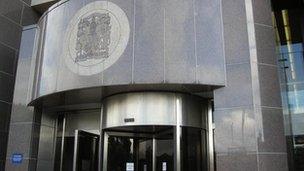Lawyers threaten action over Scottish legal aid change
- Published

Industrial action by lawyers could cause major disruption in the court system
Lawyers in Scotland have threatened to take industrial action in protest at planned government changes to criminal legal aid.
Ministers want people with a disposal income of £68 a week or more pay a financial contribution, which would be collected by solicitors themselves.
The Edinburgh Bar Association said the profession was in "crisis" and voted to consider industrial action.
The government said Scotland's £160m legal aid bill must be reduced.
It is believed the measures brought forward under the Scottish Civil Justice Council and Criminal Legal Assistance Bill, external, could save £3.9m a year from the legal aid budget.
Industrial action by lawyers could cause major disruption in the court system.
Cameron Tait, of the Edinburgh Bar Association, said the changes meant people with families earning minimum wage potentially having to pay the entire cost of their cases in the summary courts.
He added that a requirement on solicitors having to collect payments themselves could cause a conflict of interest with clients who did not pay, and lead to increased administration costs.
"The government and Scottish Legal Aid Board are aware that people accessing criminal legal aid are unlikely to pay the contributions, therefore this will simply be borne by the profession," he told the BBC.
"The profession has taken cuts year-on-year and its now got to the point where the independent criminal bar is in crisis.
"Assistants are losing their jobs across the country and, given that the government are no longer willing to engage, the profession feels such disillusionment that there's no other choice than consider industrial action."
The Law Society of Scotland has also raised concerns the move could turn solicitors into "unpaid debt collectors", saying the Scottish Legal Aid Board was the "obvious body" for collecting money.
The Scottish Parliament justice committee, which has scrutinised the bill, said it was "not opposed in principle" to people contributing towards their criminal legal aid.
But it stressed such a system "must be proportionate to the means of the individual" and asked ministers for more information on the income threshold for contributions.
The Scottish government has said about 80% of people receiving legal aid would continue to pay nothing and the plans would end a situation where contributions were collected for civil cases but not for criminal cases.
Justice Secretary Kenny MacAskill, a former lawyer, said he was happy to listen to concerns, but stressed the Scottish legal aid budget was currently the second highest in history.
He added: "Fourteen criminal defence agent firms received over £1m in public funds, so I think what's been done in preserving the integrity of the budget is appropriate.
"Equally, I have to make sure that in the tough world and tough financial challenges that we face, I keep legal aid available for those who are the victims of domestic violence, those who suffer accidents at work or accidents in the street."
- Published4 October 2012